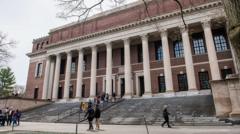Did a Judge Just Restore Funding for Harvard Against Trump's Cuts?

Published: 2025-09-03 22:21:16 | Category: technology
The recent ruling by a US federal court has reinstated approximately $2 billion (£1.5 billion) in research funding for Harvard University, which had been revoked by the Trump administration. Judge Allison Burroughs determined that the government's actions infringed upon Harvard's First Amendment rights, despite acknowledging concerns regarding antisemitism at the institution. This landmark decision not only protects Harvard's funding but also raises significant questions about the relationship between government funding and academic freedom.
Last updated: 01 November 2023 (BST)
Key Takeaways
- The court ruled against the Trump administration's funding cuts to Harvard, citing free speech violations.
- Judge Allison Burroughs highlighted concerns regarding antisemitism but found no significant link to the research funding.
- The ruling may face appeal, indicating ongoing contention between the administration and Harvard.
- Other Ivy League colleges struck deals to protect their funding amidst similar allegations.
- The decision has broader implications for academic freedom and government oversight in universities.
The Background of the Funding Cuts
In April 2023, the Trump administration announced significant funding cuts to Harvard and other prestigious universities, claiming that these institutions were promoting anti-Semitic sentiments and radical ideologies. The administration's allegations were part of a broader narrative that positioned certain universities as bastions of political bias and ideological extremism. These claims, however, were met with skepticism from many in the academic community, who argued that the cuts were politically motivated and detrimental to academic freedom.
The Court's Ruling
Judge Burroughs delivered a decisive ruling, vacating the Freeze Orders and Termination Letters that had revoked the funding. In her comprehensive 84-page decision, she stated that the government's actions violated the First Amendment rights of the university. She emphasised that while Harvard should enhance its efforts to combat antisemitism, there was an insufficient connection between the funding cuts and the alleged anti-Semitic activities on campus.
Key Arguments in the Ruling
The ruling contained several key arguments:
- First Amendment Rights: The judge asserted that Harvard's ability to conduct research freely is a fundamental aspect of academic expression protected under the First Amendment.
- Lack of Connection: Burroughs found that the claims of antisemitism were largely unrelated to the specific research activities impacted by the funding cuts.
- Political Motivations: The ruling suggested that the administration's actions were more about targeting ideological perspectives rather than addressing genuine concerns about discrimination.
Implications for Harvard and Higher Education
This ruling has significant implications not just for Harvard but for the wider landscape of higher education in the United States. The reinstatement of funding allows the university to continue its research initiatives without the looming threat of politically motivated cuts. It also serves as a precedent that reinforces the principle of academic freedom, which is essential for the pursuit of knowledge in a democratic society.
Potential for Appeal
Despite the favourable ruling for Harvard, the Trump administration has indicated that it may appeal the decision. This potential legal battle could prolong the uncertainty surrounding federal funding for higher education institutions, particularly those that are perceived as ideologically opposed to the administration's views. The outcome of any appeal will be closely watched, as it could set further precedents regarding government intervention in academic institutions.
The Broader Context of Government and Academia
The clash between the Trump administration and Harvard is symptomatic of a larger trend where political ideologies increasingly intersect with educational institutions. The accusations of antisemitism and leftist bias have been used as tools for political leverage, raising concerns about the autonomy of universities. The fact that other Ivy League institutions, such as Columbia University, chose to negotiate with the administration to preserve their funding highlights the precarious position of universities in navigating political pressures.
Responses from the Academic Community
The ruling has been largely welcomed by the academic community, which has expressed concerns about the implications of government overreach into educational matters. Many scholars have pointed out that academic freedom is vital for innovation and critical thinking, and any attempts to suppress this freedom can have long-lasting effects on society. The ruling serves as a reminder of the importance of protecting academic institutions from political interference.
Conclusion
The federal court's decision to overturn the funding cuts to Harvard University represents a significant legal victory for the institution and a reaffirmation of the importance of free speech in academia. As the possibility of an appeal looms, the implications of this case could extend far beyond Harvard, potentially shaping the future of federal funding and the autonomy of higher education in the United States. The ongoing dialogue about antisemitism and political bias in universities will likely continue, making this an essential issue for educators, policymakers, and the public alike. How universities navigate these challenges will be critical in maintaining their roles as centres of learning and discourse in a democratic society.
#HarvardFunding #AcademicFreedom #LegalVictory
FAQs
What was the ruling of the federal court regarding Harvard's funding?
The federal court ruled that the Trump administration's funding cuts to Harvard violated the university's First Amendment rights, reinstating approximately £1.5 billion in research funding.
Why did the Trump administration cut funding to Harvard?
The Trump administration alleged that Harvard was promoting antisemitism and radical left ideologies, which they claimed justified the funding cuts.
What are the potential implications of this ruling for higher education?
The ruling reinforces academic freedom and may set a precedent for how federal funding is managed and protected, especially in politically charged environments.
Is the ruling final, or can it be appealed?
The ruling may be appealed by the Trump administration, which could lead to further legal battles over funding policies and academic autonomy.
What should universities do in light of this ruling?
Universities should continue to advocate for their rights to academic freedom while also addressing concerns about discrimination and bias within their institutions.



